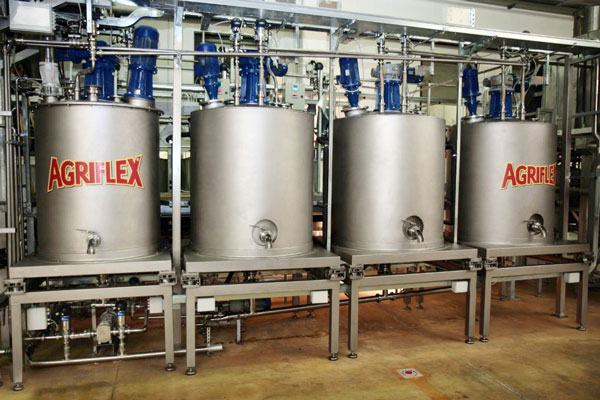 حلول مصممة حسب الطلب للصناعات الغذائية
حلول مصممة حسب الطلب للصناعات الغذائية
تعمل شركة أجريفليكس “Agriflex”، شركة إيطالية يقع مقرها في بلدية فورلي “Forlì”، منذ عام 1975 في مجال إنتاج الماكينات الأوتوماتيكية المخصصة لتخزين المساحيق، والحبوب، والمكونات السائلة، ونقلها، ومعايرتها بكميات كبيرة، ومتوسطة، ومتناهية الصغر.
تتركز الأعمال الأساسية لشركة أجريفليكس بشكل رئيسي في قطاع المواد الغذائية (الخبز، والبسكويت، والحلويات، ومنتجي المعجنات والمشروبات). إن منظومات شركة أجريفليكس مزودة بأحدث برمجيات الإدارة، والتحكم، والتشخيص التي يمكن برمجتها كذلك من على بعد، والقادرة على رصد المهام التشغيلية الرئيسية وتحرير تقارير حول الاستهلاك وقابلية تعقب دفعات الإنتاج.
وتسمح الأتمتة الصناعية، والبحث والتطوير المستمرين بابتكار حلول مباشرة، وعملية، وموثوقة يمكن تخصيصها لاستيفاء الاحتياجات والضروريات الخاصة لكافة عملاء أجريفليكس.
عندما تقترب الشركة من تنفيذ مشروع جديد، فإنها تولي اهتمامًا خاصًا بسمات المنتجات المراد تشغيلها علاوة على الظروف البيئية وقيود التصميم.
وتوفر شركة أجريفليكس 4 أنواع مختلفة من الصوامع (استخدام داخلي وخارجي) لتخزين المساحيق:
– صوامع من نسيج تريفيرا
– صوامع من الفولاذ المقاوم للصدأ بقاع مميع
– صوامع من قطاعات الفولاذ المقاوم للصدأ ESA (جاهزة للتركيب)
– صوامع مكونة من قطعة واحدة من الفولاذ غير القابل للأكسدة
كما تقدم شركة أجريفليكس نظامًا لتقدير الجرعات الدقيقة، وهو عبارة عن مجموعة من الأجهزة المخصصة لتخزين المساحيق، والحبوب، والمكونات متناهية الصغر التي تضاف إلى المكونات الأساسية للعجين، ووزنها، ومعايرتها بكميات مختلفة:
– معايرة المكونات متناهية الصغر من 20 إلى 900 جرام
– معايرة المكونات المتوسطة من 1 إلى 20 كيلوجرام
ويضمن جهاز معايرة الجرعات الدقيقة تحقيق أقصى قدر من الدقة عند تنفيذ التركيبات المطلوبة.
وفي عام 2010، وضعت شركة أجريفليكس تصورًا لنظام تبريد الدقيق ونفذته ونال براءة اختراع في عام 2013. يسمح هذا النظام المُبتكر بخفض درجة حرارة الدقيق (التي تعتمد بشكل متزايد على الظروف) أكثر من 20 درجة مما يضمن الضبط الذاتي لدرجة حرارة العجين وبالتالي تفادي عيوب الأساليب المُستخدمة حتى الآن.
منذ سنوات عديدة، تجري شركة أجريفليكس الأبحاث على أنظمة التخمير الصناعي، وتصممها، وتركبها بغرض إنتاج الخميرة الطبيعية السائلة، باستخدام دقيق الجاودار أيضًا.
 Tailor-made solutions for the food industry – Fermentation
Tailor-made solutions for the food industry – Fermentation
Since 1975 Agriflex, Italian company based in Forlì, has been designing, manufacturing and installing automatic systems for the storing, conveying and dosing of powder, granulate and liquid ingredients, in bulk, medium and micro quantities. Its focus is mainly on the food sector (bread, biscuits, confectionery, pasta manufacturers and beverage). Agriflex systems are equipped with the latest management, control and diagnosis software that can be remotely programmed and monitor the main operational functions and report on consumptions and batches traceability.
Industrial automation and continuous R&D make it possible to create straight forward, functional and reliable solutions, that can be customized to suit the unique needs and specific requirements of all its clients. When approaching a new project, Agriflex puts special attention to the characteristics of the products to be handled as well as the environmental conditions and layout constraints.
For many years Agriflex S.r.l. has been designing, manufacturing and installing industrial systems and standalone machines for the production of natural liquid yeast, suitable for many types of flours and starters.
It is an integrated solution that provides mechanical and thermal energy for preparing natural liquid yeast – from dissolution to maturation and maintenance. It guarantees consistent quality standards and constant characteristics, by controlling and managing from the operator panel and PLC, the chemical-physical parameters that influence the process, such as maturing temperature, acidity level and cooling.
Advantages
• Repeatable production process and constant quality of finished product
• Reduction in working surface areas and equipment, such as “baskets” and starter slowing cells
• Reduction in the labour force
• No specialist labour required as the process is highly automated.
Qualitative advantages of natural liquid yeast
• Reduction and possible elimination of brewer’s yeast and adjuvant additives
• Relaxing effect on the dough, making it more stretchy, softer and with improved shelf-life
• More regular crumb structure and thinner crust
• Better resistance to moulds and stringy bacteria
• Improved characteristic flavours and fragrances
• Improved nutritional value of the finished product due to the prolonged action of bacteria and yeasts
• Reduction of the phytic acid present in wholemeal bread
• Reduction of brewer’s yeast intolerance effects
• Consistency of results (reliable production quality)









